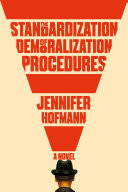The four words I hate to say the most (generally, but especially about books) are “I don‘t get it.”
When I finish a book I want to say, “This was great and here‘s why,” or “Here is why I didn‘t like this book.” Hofmann‘s writing is good enough to carry me through, but I have so many unanswered questions.
Maybe it‘s a better read for a discussion group. Any other readers care to chime in?
8 likes


















